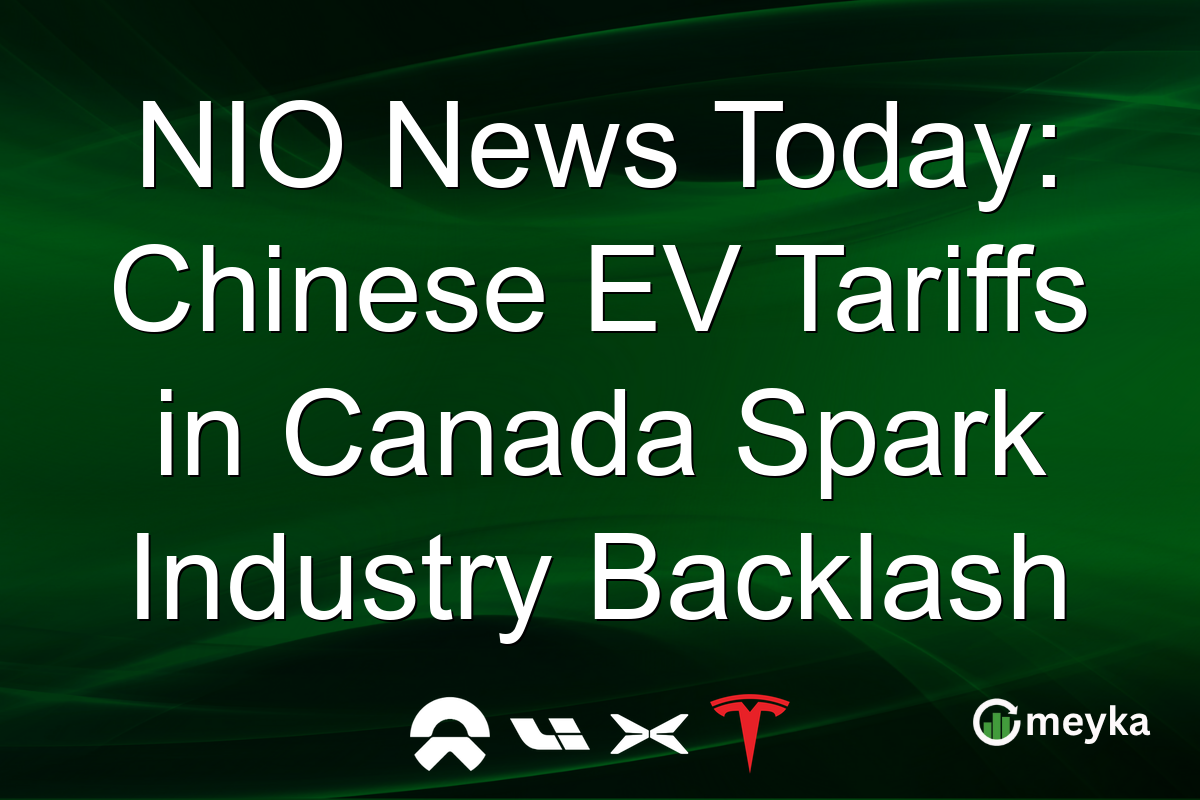NIO News Today: Chinese EV Tariffs in Canada Spark Industry Backlash
Canada’s proposal to impose significant tariffs on Chinese electric vehicles (EVs) has stirred significant debate within the auto industry. This decision follows similar actions by the US and EU, aiming to curb the influence of Chinese automakers. The repercussions of these proposed tariffs are far-reaching, affecting domestic pricing, competition, and the broader market dynamics. With companies like NIO, XPEV, and TSLA in the spotlight, analysts predict shifts in the
The Impact of Canadian Tariffs on Chinese EVs
Canada’s consideration of import tariffs on Chinese electric vehicles aims to protect local manufacturers and reduce dependency on foreign imports. This strategy mirrors the recent policy shifts by the US, as reported by Reuters. The proposed tariffs could significantly impact the competitive landscape, particularly for Chinese EV makers like NIO, LI, and XPEV. As of now, NIO trades at $6.07 with a market cap of over $13.5 billion. The potential tariffs could affect NIO’s already fluctuating stock, which has experienced a 28.54% decline over the past year. Similarly, XPEV has seen substantial growth, with a stock price rise of 120.18% over the past year, trading currently at $20.58. However, the emerging trade barriers pose risks for sustaining this momentum. The move to implement tariffs may lead to higher vehicle prices in Canada, affecting sales volumes. Analysts from Bloomberg suggest this could prompt Chinese manufacturers to reassess their strategies in North America or pivot to other markets.
Market Reactions and Corporate Responses
The market’s reaction to the potential tariffs has been mixed. While some investors worry about adverse effects on stock performance, others see a longer-term benefit in a more balanced domestic market. For companies like TSLA, which traded at $368.81 with a strong 46.95% one-year growth, the situation could present both challenges and opportunities. Tesla’s strategic presence in various regions might buffer the immediate impacts compared to its Chinese counterparts. Inside China’s auto industry, there is a growing emphasis on innovation to mitigate the effects of these tariffs. As CNBC reports, companies are investing in technology and alternative strategies to enhance competitiveness and comply with international standards. NIO, for instance, despite recent financial pressures, continues to innovate with models like their smart electric SUVs and sedans. Their recent updates in power solutions like Power Swap and Power Charger illustrate a commitment to resilience even amidst tariff threats.
The Broader Impact on Canadian and Global Auto Trade
The potential tariffs have sparked a broader discussion about Canadian auto trade policies and their alignment with global standards. These tariffs could catalyze changes in the global EV supply chain, perhaps prompting other nations to adopt similar measures. For Canadian consumers, the proposed tariffs might initially lead to higher prices or limited availability of Chinese EVs. However, they might also drive local production, potentially invigorating the domestic auto industry. As noted by Reuters, such policies aim to protect Canadian jobs and foster economic growth within the country. Globally, the tariffs are part of a larger narrative of shifting economic power and the growing importance of sustainable energy solutions. This context adds complexity to decision-making for investors who must consider not only current stock metrics but also geopolitical influences.
Final Thoughts
The discussions around imposing tariffs on Chinese EVs in Canada underline the complexities of global trade and economic policy. While intended to protect local industries, the tariffs could reshape the competition landscape, impacting companies like NIO and XPEV. As we navigate these changes, platforms like Meyka provide invaluable insights, offering real-time analysis and data to help investors adapt to market shifts and trends.
FAQs
The tariffs could lead to increased vehicle prices and alter competition, affecting both market dynamics and the strategies of Chinese manufacturers in Canada.
Tesla might face challenges from higher import costs but could also see opportunities as the market rebalances, especially given its diverse global presence.
Canada aims to protect its local auto industry and reduce dependency on foreign imports, aligning with similar measures by the US and EU to curb Chinese auto influence.
Disclaimer:
This is for information only, not financial advice. Always do your research.






